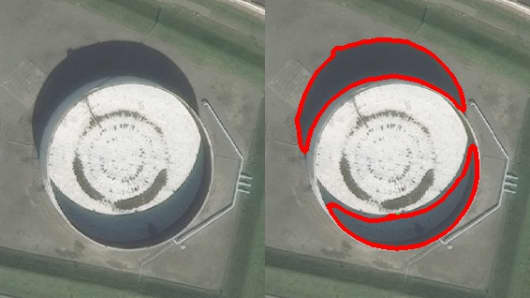As Tyrone Lyles lay dying from a gunshot wound on an East Oakland street in 2007, he let out a few last words that would ultimately help authorities convict his killer.
“Why you done me like that, Ar?” he pleaded. “Ar, why you do me like that, dude?”
The exchange, which was used in court, was recorded by ShotSpotter, a gunshot detection system that has been installed in over 90 cities across the country. By placing a series of microphones around high-crime neighborhoods, the system is able to pinpoint the location of where a gunshot took place with surprising accuracy, leading to faster response times from police.
This week, 300 of the microphones were activated in Brooklyn and the Bronx as part of a citywide pilot program.
(excerpt)
http://fusion.net/story/107298/is-nycs-new-gunshot-detection-system-recording-private-conversations/
I spy...then sell the data: Orbital's bet on satellites and drones
Imagine making an investment decision based on intelligence gathered from a satellite or drone image. James Crawford is betting people will do exactly that.
The founder and CEO of Orbital Images saw an untapped potential in the increase of surveillance hardware and decided to create software to analyze the images.
With the world of drones on the rise—federal regulators expect the industry to expand into a $90 billion business, compared to an estimated $720 million in sales last year—Orbital's goal is to capture global socioeconomic trends and sell it to hedge funds, real estate developers and other organizations.
"The really exciting thing about today's world and about what's going on in satellite imagery is that more and more satellites are being launched," Crawford told CNBC's "Closing Bell" in a recent interview. His company has "processed as many as a million images of parking lots. From that volume of imagery we can actually learn a great deal," he said.
What those parking lots tell him, for example, is how many cars are outside retail shops.
"We can actually track retail traffic in 60 major retailers and see whether or not it's up or down compared to past years," Crawford said. "That's one of the single most important things for retailers—how many people are coming in the door."
Read MoreJobs for drones are set to take off
The start-up has also measured the rate of construction in China and the fluctuations in global crude oil inventories as well as forecast the end-of-season crop harvest.
Big Brother is watching?
Orbital's business model is part of what some observers see as potentially thorny privacy issues, as civilian drones and satellites increasingly take to the skies. In a report last year, the Brookings Institution predicted private surveillance tech operators would soon outnumber their government counterparts, and said the rise of drone use "pose[s] real if manageable privacy risks."
For its part, Orbital insists its technology shouldn't raise alarm bells. While some may be concerned about Big Brother watching from above, Crawford said there are limits on the image's resolution and individuals cannot be seen.
"We can count cars, but even when we count cars we can't tell one car from another. The imagery itself and the federal limits on imagery put a major barrier to any sort of privacy issues," he said.
"Furthermore ... the whole reason we exist is to use big-data techniques and artificial intelligence techniques to really understand things at scale because that's where we think the real value is out of this data stream," Crawford added.
Read More Data, technology helping to transform sports watching: Exec
There are also no insider trading implications for anyone who uses the information when making investment decisions, because the data are considered in the public domain, Crawford said.
Orbital Insight recently announced it partnered with the venture capital firm Sequoia Capital to raise $8.7 million in funding.
http://www.cnbc.com/id/102519682
For its part, Orbital insists its technology shouldn't raise alarm bells. While some may be concerned about Big Brother watching from above, Crawford said there are limits on the image's resolution and individuals cannot be seen.
"We can count cars, but even when we count cars we can't tell one car from another. The imagery itself and the federal limits on imagery put a major barrier to any sort of privacy issues," he said.
"Furthermore ... the whole reason we exist is to use big-data techniques and artificial intelligence techniques to really understand things at scale because that's where we think the real value is out of this data stream," Crawford added.
Read More Data, technology helping to transform sports watching: Exec
There are also no insider trading implications for anyone who uses the information when making investment decisions, because the data are considered in the public domain, Crawford said.
Orbital Insight recently announced it partnered with the venture capital firm Sequoia Capital to raise $8.7 million in funding.
http://www.cnbc.com/id/102519682

No comments:
Post a Comment